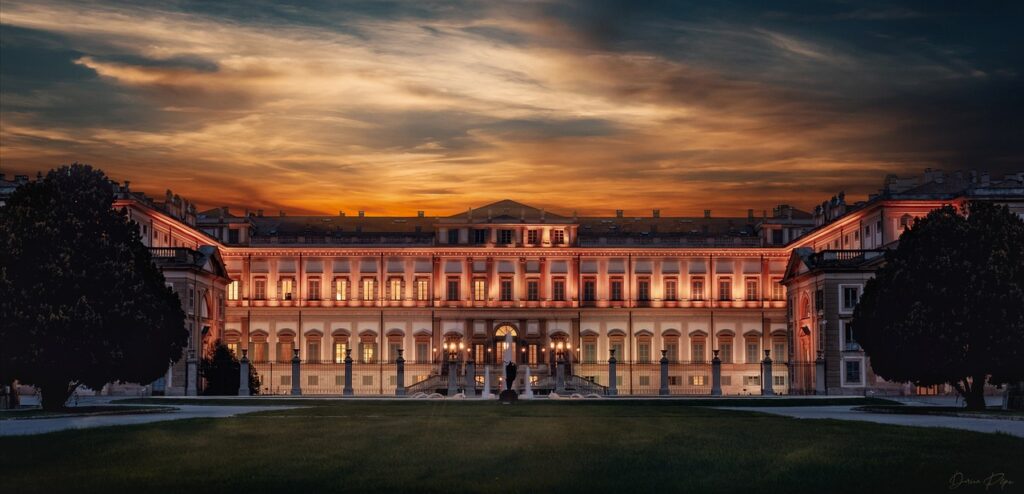Lesser-known languages
Brianzolo is a variant of the Lombardo dialect spoken in Lombardy. Brianzolo, or Brianzoeu, is traditionally spoken in Brianza, the area surrounding the city of Monza, close to Milan.
Information provided by Dr Fabio Caiani
Lombard is classed as “definitely endangered” by the World Atlas of Languages

Villa Reale, Monza (Italy)
Source: Pixabay
Ladin is a romance language spoken by approximately 40,000 people in the mountain range known as the Dolomites, between the two Italian regions of Trentino-Alto Adige and Veneto. Mostly oral, Ladin has been threatened by extinction and homogenization, but is now officially recognised as a minority language by the Italian state and the EU.
Information provided by Dr Damiano Benvegnù
Ladin is classed as “definitely endangered” by the World Atlas of Languages

Ladin inscription in the Gasthof Pider in La Val. Ladin: Na bona ustaria, na bella compagnia, düc la chir gion, vedli y jogn. – A good pub, good companions, all search for a good time, old and young
Source: Wikimedia Commons
Surzhyk is a Ukrainian-Russian pidgin.
The original meaning of the word “Surzhyk” is a mixture of wheat and rye, rye and barley, barley and oats, or flour made from such a mixture. As a result of the symbolic transfer of concepts from rural life to the linguistic phenomenon, we have the following: Surzhyk is elements of two or more languages combined artificially, without observing the norms of the literary language; impure language. Since Surzhyk is the result of mixing two different substances with a decrease in the quality of the resulting product, it turns out that Surzhyk, which is the result of the chaotic mixing of Russian and Ukrainian, is a mixed sublanguage that is inferior in quality and social status to pure Ukrainian. Surzhyk can often be heard in everyday life, in marginalised regions where a codified, pure version of the Ukrainian language has not had a chance to spread due to lack of education, the dominance of Russian influence, or lack of a clearly expressed linguistically civic and political position of native speakers.
Information provided by Mrs Viktoriia Medvied

Traditional Ukrainian hut, Museum of Folk Architecture and Ethnography in Pyrohiv
Source: Wikimedia Commons
Rumelian Turkish is a Turkish dialect group that – after the dissolution of the Ottoman Empire - is still spoken by Turkic minorities who are living in the Balkans in everyday use. According to the census of 2021, there are 62,723 speakers in North Macedonia.
Information provided by Dr Orhan Elmaz
Rumelian Turkish is classed as “definitely endangered” by the World Atlas of Languages

Ohrid (North Macedonia)
Source: Pixabay